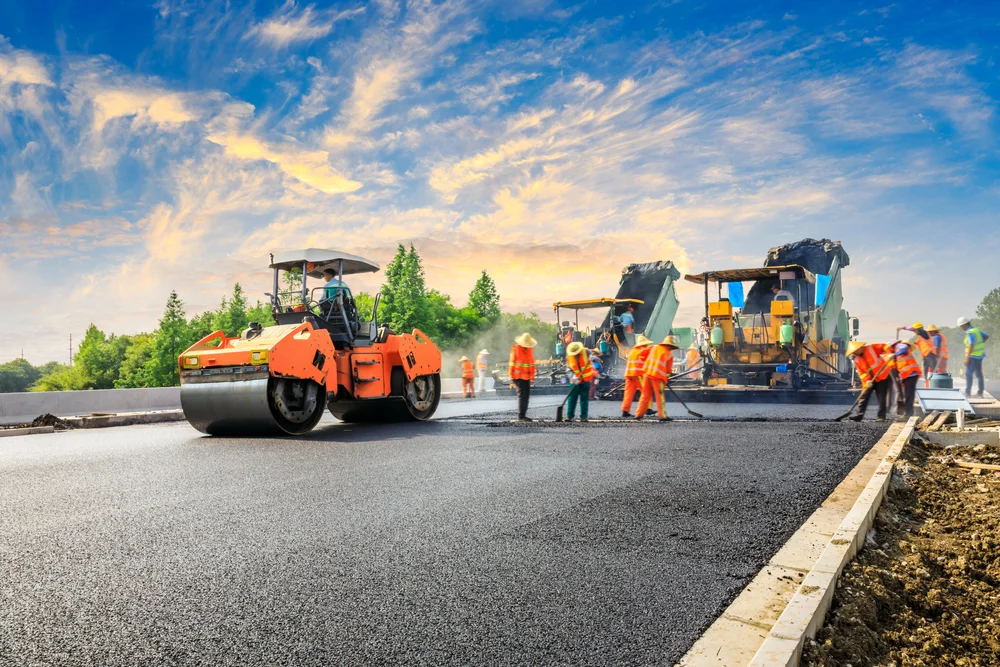Discovering the Ecological Benefits of Hot Mix Asphalt
The application of Hot Mix Asphalt in framework projects provides an engaging instance for sustainable growth and environmental stewardship. By delving right into the intricate details of its manufacturing procedures and the ingenious use recycled materials, a deeper understanding arises of exactly how this technology goes beyond plain surface applications. The ecological benefits of Hot Mix Asphalt expand much beyond first perceptions, offering a nuanced viewpoint on how this material can lead the way for a greener future.

Decreased Greenhouse Gas Emissions
The manufacturing process of Warm Mix Asphalt entails warming the combination of accumulation and asphalt binder to high temperature levels. By incorporating recovered asphalt pavement and recycled asphalt shingles right into the mix, the need for virgin products is reduced, leading to energy savings and lowered discharges connected with removal and processing.
Researches have actually shown that Hot Mix Asphalt sidewalks have a smaller sized carbon footprint over their life cycle contrasted to various other pavement alternatives. The longevity and recyclability of Warm Mix Asphalt even more improve its ecological advantages by decreasing the need for frequent maintenance or substitute, therefore conserving resources and reducing exhausts connected with repair activities.
Energy Efficiency and Conservation
The production process of Warm Mix Asphalt not only decreases greenhouse gas discharges but additionally contributes substantially to power effectiveness and conservation efforts. Energy efficiency is an essential advantage of Hot Mix Asphalt production contrasted to other sidewalk types. The sturdiness of Hot Mix Asphalt reduces the frequency of maintenance and restoration, leading to long-term energy financial savings.
Lasting Sidewalk Solutions

One trick element of lasting sidewalk options is the usage of recycled products such as reclaimed asphalt pavement (RAP) and recycled asphalt roof shingles (RAS) By including these products into the asphalt mixes, the demand for virgin sources is lowered, leading to lower power consumption and greenhouse gas emissions throughout manufacturing. In addition, the reuse of these products aids draw away waste from land fills, adding to a much more circular and sustainable economic situation.
Moreover, lasting sidewalk options concentrate on enhancing pavement design to improve performance and longevity. Strategies such as warm mix asphalt (WMA) and rock mastic asphalt (SMA) enhance the toughness and durability of sidewalks, decreasing the need for regular repair services and replacements. By implementing these innovative approaches, framework designers can produce pavements like this that not just satisfy high-performance requirements however additionally reduce their environmental impact.
Minimized Environmental Impact
Warm mix asphalt, in certain, supplies several benefits that contribute to decreasing the general ecological footprint of roadway framework. One essential aspect is the recyclability of asphalt, news which can be reused numerous times without jeopardizing its high quality - Regrading.
Moreover, the production of hot mix asphalt sends out reduced degrees of greenhouse gases contrasted to various other sidewalk materials, making it a more eco friendly option. The power effectiveness of asphalt plants has actually also improved throughout the years, bring about lowered gas intake and lower discharges. Additionally, the smooth surface of hot mix asphalt minimizes rolling resistance for cars, resulting in reduced fuel usage and decreased air pollution from car discharges.
Payment to Environment Adjustment Reduction
Warm mix asphalt plays a critical role in mitigating climate change through its lasting homes and minimized environmental impact. One substantial payment to climate change mitigation originates from the energy effectiveness of warm mix asphalt production. Contrasted to various other pavement choices, the manufacturing process for hot mix asphalt takes in less energy and sends out reduced levels of greenhouse gases, therefore decreasing its total carbon footprint.
Moreover, hot mix asphalt's capability to reflect sunlight, referred to as albedo, helps in lowering city warmth island impacts. By lessening heat absorption and retention, warm mix asphalt pavements can reduce the need for air conditioning in city areas, consequently reducing greenhouse gas exhausts connected with energy consumption for cooling down purposes.
Furthermore, the toughness and recyclability of warm mix asphalt better boost its environment modification mitigation capacities. Regrading. The lengthy life expectancy of asphalt sidewalks lowers the need for frequent repair work or substitutes, eventually decreasing the carbon emissions connected to roadway maintenance activities. In addition, the recyclability of asphalt products minimizes the demand for virgin resources and decreases the environmental impact of pavement construction, aligning with lasting practices for environment adjustment reduction.
Verdict
In conclusion, the ecological advantages of Hot Mix Asphalt show its considerable payment to decreasing greenhouse gas exhausts, conserving power, and reducing ecological influence. This sustainable pavement solution aligns with climate modification mitigation efforts, advertises resource preservation, and enhances framework advancement. By making use of recycled materials, energy-efficient manufacturing processes, and long lasting design, Hot Mix Asphalt plays an essential function in promoting an extra eco-friendly technique to framework building.
The production process of Hot Mix Asphalt involves heating up the blend of aggregate and asphalt binder to high temperature levels. By incorporating recovered asphalt sidewalk and recycled asphalt roof shingles right into the mix, the requirement for virgin materials is decreased, view it now leading to power cost savings and reduced exhausts linked with extraction and handling.
One trick element of lasting pavement remedies is the usage of recycled materials such as recovered asphalt sidewalk (RAP) and recycled asphalt tiles (RAS) Techniques such as warm mix asphalt (WMA) and rock mastic asphalt (SMA) boost the durability and durability of sidewalks, reducing the need for regular repair services and substitutes. Compared to various other pavement options, the production process for hot mix asphalt consumes less power and emits lower levels of greenhouse gases, hence minimizing its overall carbon footprint.